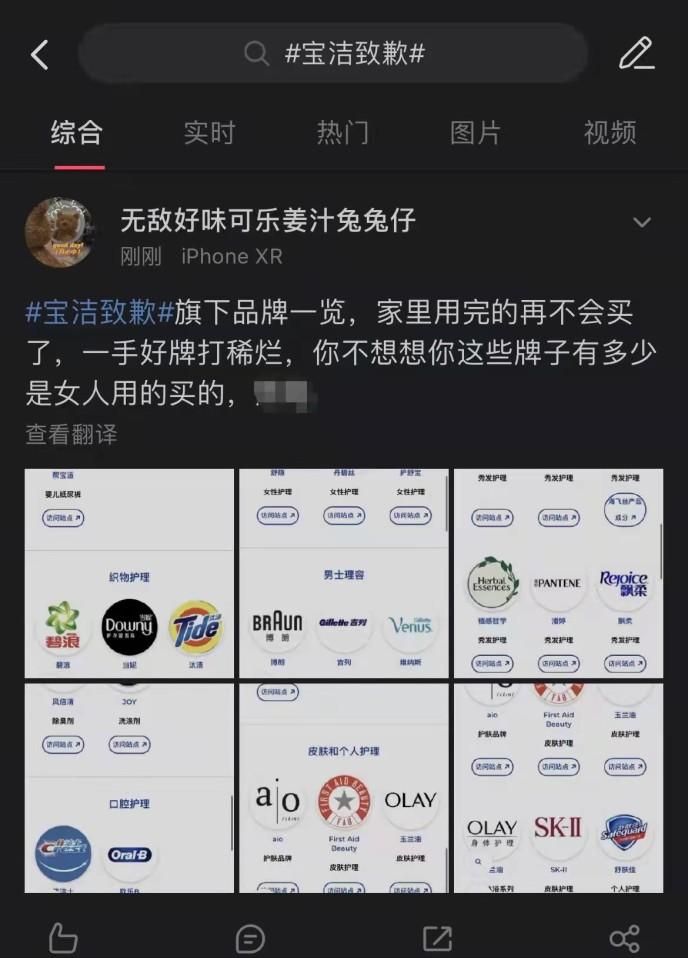Reporter Li Haoyue
On March 24, P&G rushed to the hot search for controversial content. It is understood that the "Procter & Gamble Member Center" public account previously released an article titled "Women's Foot Odor is 5 Times that of Men?" Don't Believe It Now" article, which lists many examples of women's body parts that are not as clean as men's.
The Securities Daily reporter asked Procter & Gamble for verification, and the relevant person in charge of P&G China told reporters, "We solemnly apologize for the inappropriate content of a recent article on the P&G Member Center account for disrespecting women." Procter & Gamble has always advocated the values of equality, inclusion and respect. We have deleted this article and seriously rectified the operation of this account. We will reflect deeply and prevent similar situations from happening again. ”

After the fermentation of the matter, P&G's sub-brands were all listed by netizens, and some consumers sent microblogs to express resistance.
According to the Southwest Securities Research Report, Procter & Gamble is the largest consumer goods company in China. P&G's official website also shows that there are more than 20 brands in China, such as SK-II, Olay, Haifeisi, Pantene, Crest, and Hushubao.
According to P&G's fiscal 2022 second quarter report (three months ending December 31, 2021), the company includes five major businesses and ten categories: beauty (hair care, skin and personal care), beauty (shaving care, electrical appliances), health care (oral care, personal care), fabric and home care, baby women and home care.
P&G's fiscal second-quarter net sales were $21 billion, with a market estimate of $20.35 billion, and organic revenue, excluding acquisitions and divestiture transactions and the impact of foreign exchange rates, rose 6 percent in the quarter, higher than expected. Net profit for the same period was $4.22 billion, up 10% year-over-year.
It is worth mentioning that the highest proportion of P&G's net sales by category is fabric care, reaching 22%, and the brands operating in this category in China are mainly Bilang, Donnie and Tide; women's care accounts for only 6%, ranking second from the bottom among the ten categories, and the brands operating in China are mainly Shuyin, Danbisi and Hushubao.
Although women's nursing accounts for a small proportion of P&G's overall performance, P&G still occupies a leading position in China's female care market. According to the data of the China Business Industry Research Institute, in 2021, the top ten brands in the sales of female care on e-commerce platforms such as Tmall, JD.com, and Pinduoduo are foreign-funded enterprises. Procter & Gamble's Guardian Shu Bao sold first, followed by Sophie, Gao Jiesi and Leerya.
This also means that P&G has a huge number of female users in China. But why is there such a problem?
"It's normal for Procter & Gamble to be boycotted this time. Because from the current environment, this kind of move can easily anger Chinese consumers, especially involving gender issues. Jiang Han, a senior researcher at Pangu Think Tank, told the Securities Daily reporter that even giants will "lose their hands" in the control of marketing content, and some marketing with their own traffic actually has the risk of causing controversy.
In fact, the brands that have apologized for getting caught up in the gender controversy in the past two years are not only Procter & Gamble.
In February 2021, stand-up comedian Li Shiyin brought goods for women's lingerie brand Ubras on Weibo, and posted a Weibo with the copy of "A device that allows women to easily lie down and win the workplace". Afterwards, he was punished by the Beijing Haidian District Market Supervision Bureau. The notice shows that it violates the relevant provisions of the Advertising Law, and the content of the copy is vulgar and insults to the dignity of women. At the same time, lingerie brand Ubras also quickly apologized after the incident fermented.
In addition, the daily necessities brand Cotton Times also released a video advertisement for men trailing women last year in order to promote makeup remover products, causing resistance and dissatisfaction among female users, and finally apologized to the brand and deleted the advertisement.
"In the current environment, for brands, we must consider the situation of the entire market while marketing." It is necessary to understand who the specific audience of marketing is, but also to have a grasp of the sensitivity of the entire market, only in this way can we promote the subsequent promotion and development of the brand. Jiang Han added.
(Edited by Qiao Chuanchuan)